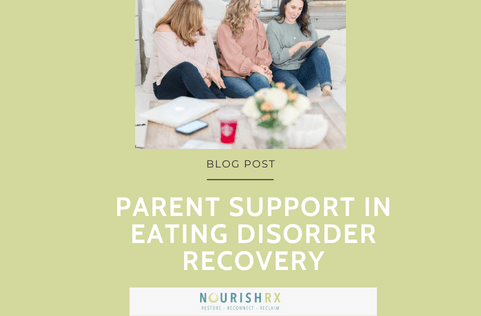There is nothing scarier than being a parent who has just been told that her child meets criteria for an eating disorder diagnosis. You can scour the internet for any kind of parent support but what you typically find can leave you feeling even more confused or overwhelmed.
The phrases and words associated with eating disorder recovery are typically so foreign that you may be confused as to where to even start.
We hear you.
And want you to know that we have your back. Let's take this one step at a time and break down what you need to know for parent support in eating disorder recovery.
Let's start by breaking down what all of this information means so that you have some clarity (and peace of mind) in making an informed decision in the care of your child.

how are eating disorders diagnosed?
Eating disorders a complex diagnosis. They are only able to be truly diagnosed by a qualified healthcare provider which may include: your child's pediatrician, psychiatrist or therapeutic support who hold credentials that allow them to provide diagnoses. Your dietitian, although may be specialized in assessing and nutritional management of eating disorder behaviors, is unable to provide a formal diagnosis.
However, you do not have to wait for a formal diagnosis to seek care. If you notice any potential signs and symptoms of a disordered relationship with food we recommend that you reach out to NourishRX or your child's physician to help you navigate the best next steps and assemble a treatment team.
who treats eating disorders?
We talk through the key players for parent support in our blog post here. The importance of the treatment team is also reviewed in our Jumpstart for Parents and Caregivers course.
what are the options for care?
Here at NourishRX we are an outpatient eating disorder dietitians which mean that we are the lowest level of care when it comes to eating disorder recovery.
Understanding that there are additional support options if treating your loved one's eating disorder is unable to happen in the home environment can be a comforting thought. However, we also find it helpful to review what these additional levels of care are so you can further understand all of the potential options for treatment.
reaching out to a treatment center
Eating disorder treatment can be broken up into 5 levels of care: outpatient, intensive outpatient program (IOP), partial hospitalization program (PHP), acute residential treatment, and inpatient. There is no one starting point for eating disorder treatment. This means that these 5 levels of care we are about to review are not a linear progression. Your child may jump back and forth between different levels and we want you to know this is a normal continuation in eating disorder recovery.
Level 1: Outpatient
This is us! If your child is medically stable it may be recommended they get started in an outpatient level of care, which is the lowest level of support. Outpatient treatment includes creating an interdisciplinary team for your child which consists of a therapist, dietitian, physician, and sometimes a psychiatrist. Ideally, all members of the team will specialize in eating disorders and these clinicians will work closely with your child and your family to provide them with the nutrition and support they need to challenge and recover from their eating disorder.
It is important to note, your child’s outpatient team is necessary to create regardless of the level of care they are participating in. The outpatient team will continue to work closely with your family as your child moves between or maintains consistency in the various levels of care. Since this is the lowest level of support we typically recommend companion services in addition to your 1:1 nutrition care. This allows us to elevate the standard of outpatient care and all for an increase in parent support!
Level 2: Intensive Outpatient (IOP)
An IOP is typically a 3-hour program that runs 3-5 days a week (but this varies based on treatment center). It is normally held late afternoon to early evening, but may also be held in the mornings. IOP includes therapeutic and nutrition education groups, individual therapy, and meal support for a meal and/or snack. In IOP programs, your child will be assigned a case manager or therapist who they will meet with 1-2 times a week. Depending on the program, your child may also be assigned a dietitian.
Those who meet IOP level of care will be able to follow a meal plan and manage other eating disorder behaviors such as exercise, binging, purging, and restriction without intense monitoring and supervision. At this level of care, your child is motivated to recover and is not at imminent medical risk or harm to themselves. Symptoms are generally under control at this point, and individuals are able to function within their daily lives with minimal support.
Level 3: Partial Hospitalization Program (PHP)
A PHP is a day program that runs up to 7 days a week and can last 6-12 hours per day. PHP is typically recommended if your child is medically stable, but would benefit from daily support to not engage in eating disorder behaviors. Your child will have the majority of their meals and snacks at the program with meal support from case managers and dietitians. They will also be assigned a case manager/therapist, dietitian, and psychiatrist who they will meet with at least once a week.
Level 4: Residential Treatment (Resi)
An acute residential treatment center will provide 24/7 support for your child. At this stage, your child is medically stable to the degree in which they do not need IV fluids, tube feedings, or daily labs drawn to monitor levels such as potassium, magnesium, and phosphate.
An acute residential treatment center will focus on interrupting your child’s eating disorder behaviors such as restriction, purging, binging, and over-exercise. During their stay, your child will begin to learn therapeutic coping mechanisms to manage eating disorder thoughts and urges. They will be assigned a treatment team, which includes a case manager/therapist, dietitian, and psychiatrist, who they will meet with 1-2 times a week.
Therapeutic meal support will be provided at each meal and snack, along with attending therapeutic and nutrition education groups during the day. Acute residential treatment stays may be 30 days or more depending on your child's individual needs.
As a parent, the thought of acute residential treatment can be a big jump between the previous lower levels of care. At this stage, you may feel like you lose control and you are putting trust in the staff at treatment facilities to take care of your child. Remember these facilities have the professionals your child may need to win the battle with their eating disorder and full, 24/7 immersion in the treatment process may lead to improved outcomes.
Level 5: Inpatient Treatment
Inpatient level of care is a medical admission to a hospital where your child will receive 24-hour medical monitoring by professionals who can keep an eye on your child’s vital signs, blood work, and need for nutrition support, such as tube feed or intravenous fluids.
At this stage of your child’s recovery, they are preoccupied with intrusive eating disorder thoughts and may be uncooperative with treatment without a highly structured environment requiring constant monitoring. An inpatient level of care is required when your child’s behaviors have significantly compromised their medical stability.
An inpatient level of care stay is typically short term and once discharged, it may be recommended your child step down to a lower level of care dependent on need.
what should my level of involvement be as a parent?
Your level of involvement in the recovery process is going to vary depending on the treatment recommendations and level of care. The lower level of care, typically the more involved the parents or caregivers become.
At NourishRX we love to have parent involvement so we are able to provide appropriate parent support as well as adequate care to your loved one. This typically looks like having parents be present for sessions so recommendations and goals are able to be set together.
However, we recognize that 60 minutes a week reviewing goals and next steps may not feel like a lot when you are dealing with your loved one's eating disorder 24/7. This is where additional support through a self paced, fully virtual course can come into play. Our Jumpstart for Parents and Caregiver's Course will walk you through the expectations of care at home and provide additional parent support for you in your difficult times.

working with nourishrx
NourishRX is here to provide any support you may need through your child’s recovery journey. Drop us a line to have a FREE Questions and Clarity call to see if our services meet your current needs.
Comments Off on Parent Support in Eating Disorder Recovery